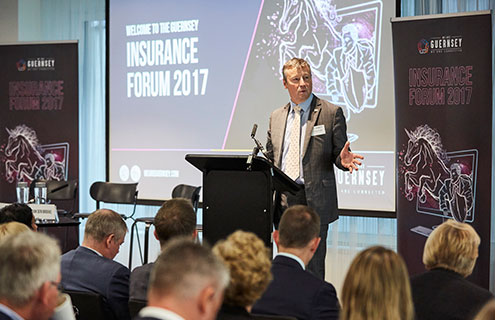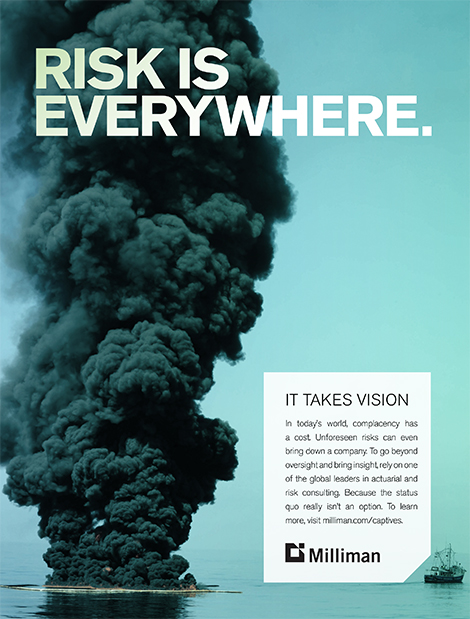Opening the Guernsey Insurance Forum in London, Dominic Wheatley, CEO of Guernsey Finance, looked back to last year’s event, which focused on the changing nature of offshore insurance and the development of reinsurance vehicles brining new capital to the market.
Opening the Guernsey Insurance Forum in London, Dominic Wheatley, CEO of Guernsey Finance, looked back to last year’s event, which focused on the changing nature of offshore insurance and the development of reinsurance vehicles brining new capital to the market.
Wheatley explained that Guernsey, over the last few years, has proved to be an “ideal home” for those vehicles, given its expertise, administration and regulatory environment.
This year, the conference concentrated on how the insurance industry is innovating and evolving in response to global trends and challenges.
Wheatley suggested that an ageing population all over the world is causing a “rethink of assumptions and practices” in society and economy.
He said: “Some of these are dealing with how we reorganise ourselves to reflect a very different age profile across the human race, and some are dealing with the strain that is on existing infrastructure.”
He noted that over the last few years, including in recent transactions, Guernsey has been working with a number of the larger pension advisers focusing on the strain that longevity risk is facing on UK fixed-benefit pension schemes.
Wheatley commented: “The pioneering work that has been done in that area using special purpose vehicles around cell technology is definitely playing a significant role in helping to secure the long-term economic wellbeing of millions of working Britons.”
He added: “Our captives are also increasingly helping to deliver effective employee benefit packages and travel insurance to support employees while they are working abroad.”
A big topic of this year’s forum was cyber risk, which is fast-becoming a major operational risk for many companies.
According to Wheatley, the “advantage of combining your own capital through your captive with market solutions, and significant risk mitigation, is delivering increasingly effective protection for many companies”.
He said: “In all of these examples, the Guernsey industry is working with international partners to create real-world solutions to real-world issues.”
Following on from Wheatley was keynote speaker James Trainor, senior vice president of cyber solutions at Aon and former head of the FBI’s cyber division.
He revealed that losses from cybercrime are only likely to increase because of far-reaching global connectivity.
Trainor revealed that a 2014 study by the Centre of Strategic and International Studies, which attributed annual losses of $445 billion to cybercrime, is now “vastly underestimating the current position”.
He explained: “Various organisations have done research, over the last couple of years, and some suggest that that the figure will go up to $6 trillion.”
“The internet of things is a perfect example; there’s about six or seven billion devices connected to the internet now.”
“That number could go up to 20 or even 50 billion devices in the next three to five years, so more connectivity means more opportunities to do denial-of-service attacks, more vectors into your network, more opportunities to crypt those devices to make money.”
Trainor warned attendees of the forum that there is currently a lack of insurance premiums being taken to cover for the estimated losses from these cyber-attacks.
He said: “I’m not sure $6 trillion is the real number, but I do know the insurance premiums that are coming in, which is about $3 billion annually on cyber.”
“So, whether it’s $445 billion or $6 trillion, there’s only three billion in capital—that’s a significant gap. Essentially, companies are absorbing the losses for this.”
He added: “That’s why I call cyber somewhat of a team sport, meaning that companies have to do a better job of protecting their network, the insurance industry has to bring more capital into the industry to cover the losses and government has to do a better job of disrupting it.”
Trainor emphasised the importance of having trusted advisers who could navigate what was becoming an increasingly complicated space.
He stated: “If cyber security is very complicated, cyber insurance is equally complicated.”
“The past is less indicative of the future in cyber. We don’t have 350 years of actuarial data to underwrite cyber risk—the threat evolves.”
“Ransomware is a perfect example of how the threat has evolved over the last three years. It went from getting paid from a credit card or PayPal to now having to do the transaction entirely on Tor, which is an anonymised browser, and pay via a virtual currency.”
Delegates also heard how insurance will be central to mitigating transition risk caused by 21st-century megatrends.
In the first panel session, moderated by television presenter and journalist Naga Munchetty, Rowan Douglas, chief executive of capital science and policy at Willis Towers Watson, explained that reinsurance is the “ultimate global community product” to fund post-disaster relief and that insurers had a leading role to play in protecting against the impact of natural disaster.
Douglas suggested that there is a 1 percent chance of the world suffering approximately $1.3 trillion of natural catastrophe losses in 2018.
He said: “That is increasing because of growing exposure and the gradual effects of climate change.”
He also discussed the future of technology in the insurance sector and how insurtechs are helping the industry become more efficient and increasing direct supply and distribution changes.
Douglas explained: “What will really change [in the sector] is how resilience-related services and transactions are wrapped up and integrated within mainstream [insurance] business. That is the revolution—it’s not about technology, it’s about rethinking how resilience is going to be incorporated into core financial valuation and how that’s going to be transacted and traded.”
He added: “And that’s very exciting because it’s our industry, not banking, or even asset management, that sits at the heart of that revolution.”
Natural disasters, or environmental issues, and technology were two of the top five megatrends highlighted by Jonathan Howe, PwC’s global insurtech leader.
Howe also noted how important it is for different parts of the industry to work together—especially start-ups and incumbents—agreeing that there is a place for them not only to co-exist, but also to collaborate.
He claimed that insurtechs need the industry because they lack vital elements such as money, customers and data, but insurers also need access to the flexibility, innovation and new ideas offered by insurtechs.
Howe said: “I think it’s the only way forward. People said there would not be much disruption in insurance and I think that’s right. By far the majority of insurtech start-ups I see, probably well over 90 percent, are not trying to be insurance companies end-to-end.”
“These are companies that have some technology and are looking at a very specific part of the insurance value chain, a really small niche, and saying they can do that better and can solve that problem.”
“You could build it in-house, but it takes three or four years and the end result is generally disappointing. It’s flexibility at speed and they need each other to move.”
Agreeing with Howe, James Sore, chief investment officer of Syndicate Room, suggested that incumbents and start-ups working together in harmony is key to achieving the best possible innovation in the insurance sector.
Speaking on the second panel, Creating a Suitable Environment for Unicorns, Sore suggested that, historically, start-ups had not been able to engage and make progress with incumbents around implementing their ideas and technology, “but the pressure nowadays to adapt and develop meant that incumbents are more open than ever to interacting with start-ups”.
Sore explained: “What works really well is when it’s constantly evolving and both start-ups and incumbents are dynamically changing what they need to design and invest in.”
He added: “A good few years ago there was a disconnect between the start-ups and the ability to actually make their new companies and ideas relevant. When it really takes off is when the incumbents are brought into that process, so they can actually implement the concept.”
“The incumbents, the big existing providers, are still around for a reason—because they manage risk. But you also have the start-up mentality of ‘I can do anything and change the world’. It’s about finding the balance between the two. You get the best innovation when you combine an incumbent working alongside the start-up environment.”
Speaking on regulation, Sore suggested that it should be “reassuringly difficult” for a new company to get regulated as the process helps “weed out” the wrong types of behaviours and filter out ideas that are not particularly solid.
He added: “If things are too easy, you end up running too much risk and you don’t necessarily reap the benefits. It should be reassuringly difficult, but navigable. There should be a clear way to get to these people [regulators] and you should have the information to give yourself the best chance, but it shouldn’t be an easy process.”
Caroline Bradley, deputy director of the Insurance Division at the Guernsey Financial Services Commission, added that it is important to “strike a balance between regulation and encouraging new ideas”.
Bradley added: “As regulators, we need to be careful that we don’t become a deterrent to new start-ups. We need to recognise that these new technologies can enhance the customer experience, but be aware of the risks as well as the opportunities.”
“It may be a great journey to buy the product, but how do we then look after the customer afterwards and deal with complaints? We don’t want to stifle innovation but at the same time, we’ve got to think about the risk to consumers and the financial world generally.”





